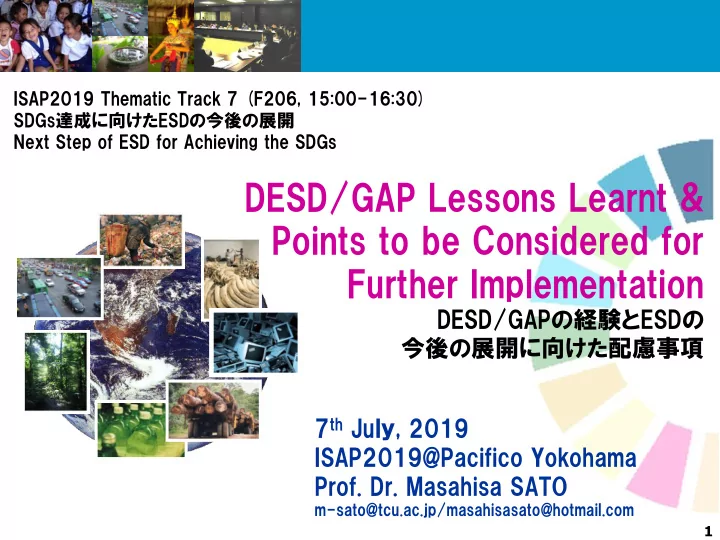

ISAP2019 Thematic Track 7 (F206, 15:00-16:30) SDGs 達成に向けた ESD の今後の展開 Next Step of ESD for Achieving the SDGs DESD/GAP Lessons Learnt & Points to be Considered for Further Implementation DESD/GAP の経験と ESD の 今後の展開に向けた配慮事項 7 th Ju ly , 2019 ISAP2019@Pacifico Yokohama Prof. Dr. Masahisa SATO m-sato@tcu.ac.jp/masahisasato@hotmail.com 1
Reflection of UN ・ DESD ( 2005-2014) ESD : 2 Origins ; SD & Human Development Approach ◆“ Human Development Approach ”、 Quality Basic Education, Universalization of Access and Promoting Equity 人間開発アプローチ (1948: The Declaration of Human Rights, 1989: Convention on Right of the Child - CRC, 1990: WCEFA and Jomtien Declaration on Education for All – EFA, 2000: WEF and Dakar Framework of Action, 2000-2015: MDG 2- 3, 2003-2012: UNLD) Economical Development ESD UNCED DESD ・ Social ( 1992 ) ( 2005-2014 ) Development ◆ “ Sustainable Development ” & Education 持続可能な開発と教育 (1972: UN Conference on Human Environment in Stockholm, 1977: Tbilisi, 1987: Moscow, Brundtland Report – Our common future, 1992: Rio Summit – Agenda 21 Chap 36, 1994: World Summit for Social Development, 1995: 2 nd UN Conference on Human Settlements, 4 th World Conference on Women, 1996; World Food Summit, 1997: Thessaloniki Declaration) 2 UNESCO ( 2005 ) DESD-IIS
Implications of “ESD” Sustainable Issues ESD : Sustainability Issues & ESD Culture 文化 Economy Society ESD 経済 社会 Environment 環境 3
Implications of “ESD” Learning to transform oneself and society ESD : Learning to Transform Oneself and Society Transform Oneself Transform ESD 個人変容 Society 社会変容 New Pillars of Learning ( UNESCO 2009 ) “ Learning to Transform Oneself and Society ” 佐藤( 2016 )訳:個人変容と社会変容の学びの連関 4
Implications of “ESD” Different Views ESD : Different Views ( About 、 In 、 For and As ) IN Education in Sustainability 体験 ( Participation, Collaboration, Dialogue ) AS Interpretivistic ABOUT Education as Education about ESD Sustainability Sustainability 内省 知識・技能伝達 ( Self Learning ) ( Knowledge Transfer ) Reflective, Intrinsic Positivistic FOR Education for Sustainability 態度・行動 ( Attitude and Action ) Critical Theory 5
Implications of “ESD” Social Learning(Sato, et.al ., 2016) [ 1960s ~] [ 1990s ~] [ 2000s ~] Real World Experiences Under the Condition of Model Observation, VUCA Imitation, Behavior Modification Collaborative Governance Social Individual Institutional System, Capacity Capacity, Sustain- Organizational ability How individuals learn Management from Society “ Cognitive Process that “ Ecologically, Sustainable “ Organizational Mgt, occurs in social context ” Collective Learning ” Organizational Learning ” Social Learning (1) Social Learning (2) Social Learning (3) 6
UNESCO Forum on ESD and GCED 2 nd -5 th July 2019, Hanoi, VIETNAM 7
Next Step of ESD for Achieving the SDGs, ESD for 2030 PRINCIPLES • “Learning to transform Oneself and Society” in era of Technological Advances (enquiry process, collaboration, individual & social change, ICT use for the learning) • Responding to the “Nature of SDGs” ( e.g. planetary boundaries, no one left behind, world of view of transformation, integrated problem solving, back casting) TOOLS/TECHNIQUES • “Key Competencies in Sustainability” ( e.g. systems thinking, anticipatory, normative, strategic, collaboration, critical thinking, self awareness, integrated problem solving) • Participatory Approach & Collaborative Governance (e.g. collaborative governance, social learning, facilitative leadership, synergy effect, social ecosystem) • M&E Mechanism, Indicator Settings • Business Sector Involvement • Research on Individual / Societal Transformation STRATEGIES • Funding • Communication and Advocacy • Inclusive Network of Partners • Nationwide / Regionwide Multi-stakeholder Initiatives 8
Recommend
More recommend